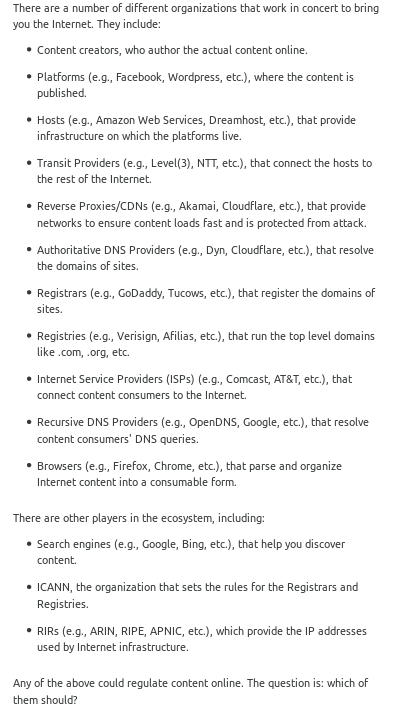What are the limits of freedom of speech on the Internet? Is online censorship a desirable good, a necessary evil, or a bad idea be avoided?
Full freedom of speech is a double edged sword. On the plus side, it protects a nation’s citizens from an abusive government, and in that sense can even curb government corruption. On the negative side, it enables people to say things beyond the scope of ‘proper speech’, including hate speech, misinformation, and sometimes even pure lies. The Internet proliferates both sides of the debate because of
- The ease of creating new uncensored content
- The ease of accessing near infinite information from a variety of sources
- The speed at which information travels across the globe once posted
- The permanence of any information posted on the Internet.
Point 1 gives everyone and anyone a chance to share their opinion, regardless of whether or not it should be shared or provides any social good. For me, content that promotes or incites hate or violence1 does not provide social good, and should be censored. Point 2 furthers this issue by allowed vulnerable individuals to access this dangerous content. Many of the people behind recent mass shootings were influenced in some way by hateful online content, such as the El Paso shooting massacre manifesto posted on 8chan. Points 3 and 4 are also troubling, especially in the context of misinformation. Whether malicious or accidental, misinformation often spreads out of control like a wildfire. In the age of Fake News, it is often hard to discern the ground truth with all the extraneous information floating around. In addition to censoring excessively hateful content, I believe some sort of fact checking system should exist, which is why I side with Twitter’s decision to block political ads completely, over Facebook who refuses to do any scanning for factual correctness in political ads.
In terms of who is responsible for monitoring and censoring content, I was struck by the large amount of players involved in the process of generating and displaying Internet content discussed in the Cloudflare article2

As the article asks, who is responsible for censoring content? The most obvious example talked is probably the Platform itself, such as Facebook or Wordpress, but as the Cloudflare article makes clear, any of those entities could decide to block content of their own choosing. Even my firefox browser could chose to block or modify incoming content before it renders it. Lastly, the government could choose to enforce censorship at any of these levels, such as the example talked about in class of search engines in China modifying search results to suit the government’s desires.
In practice, I understand that deciding to actual censor content is a slippery slope. I believe companies should be allowed to block content that goes against their beliefs, as long as these beliefs are made publicly available, are clearly articulated, and are consistent across different decisions. This rule does not apply to decisions based purely from a business perspective. For me, these beliefs only extend into the ethical (or maybe political) realms, not the business world. Companies are allowed to have whatever (legal) business practices they want, but these practices should not drive their censorship model.
1This is especially true of content presented in a condescending one-sided manner without promoting discussion around the issue
2https://blog.cloudflare.com/why-we-terminated-daily-stormer/